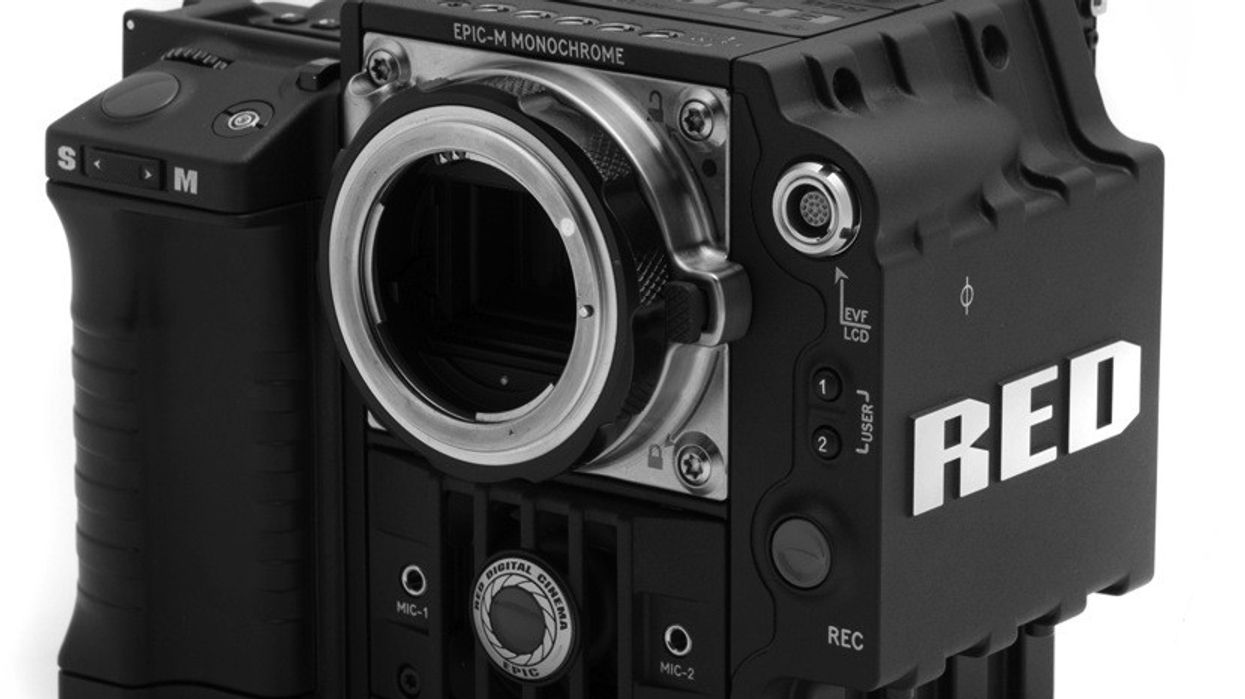RED Announces Black-and-White 'EPIC Monochrome' Camera, David Fincher Already Shooting With It

As the large-sensor camera market gets more and more crowded, manufacturers are coming up with new ways of differentiating themselves. Here's something unique that I don't think many saw coming: RED has just announced a monochrome version of the RED EPIC-M. Yes, it only does black-and-white. Why would they do this? Because without the need to debayer (the process by which colors are interpolated from otherwise colorless data), the full luminance values can be utilized, giving sharper and theoretically lower-noise images. David Fincher is reportedly already shooting with the EPIC Monochrome.
Posting at REDUSER, Jarred Land writes:
I am pleased to announce the Epic-M Monochrome.
Newly Developed Mysterium-X Monochrome Sensor.
Native ASA 2000.
Increased net resolution ( Removal of the debayer process, so every single individual pixel is used for luminance / image data )
New Low Pass Filter with to accomodate the reduced pixel pitch ( 1x1 vs 2x2 Bayer )
$42,000 ( brain only ) includes upgrade to Dragon Monochrome Sensor spring 2013.
David Fincher is shooting his current project solely on Epic-M Monochrome cameras as we speak.
Pre-orders open on RED.COM Monday. Ships October 1st.
Oh, and the real camera is colored just like the other RED cameras, which is to say its buttons are, you guessed it, red:
Interestingly enough, the "native ASA 2000" may have implications for the forthcoming RED Dragon sensor; according to this post on RED's site, Jim Jannard's claim that on Dragon "ISO 2000 looks better than MX at ISO 800" wasn't just a number picked out of a hat, but is instead indicative that Dragon will also be "Native ISO 2000." Get your ND filters ready...
Writing later in the same thread, Jarred added:
It is significant to people that live in the B&W world. It is a request that we have had many times over the years just never had the resources to make it a reality.. until now. Having a dedicated BW camera if you are shooting BW is leaps and bounds better than shooting in color then transferring to BW later. It is why they continue to make BW film. There is no color filters on each of the pixels so you get increased light to each pixel, and there is no debayer process, so you get a much "sharper" image... a better tonal transfer in gradients as there is no interpolation.
Indeed, there is no camera like it and one can only imagine this is the best black-and-white digital cinema camera in the world... by default. (Are there others?) Unless your name is Daddy Warbucks you are not going to buy one of these, but for high-end film production where the finished product is black-and-white, this would likely be the top rental target.
More details via RED:
Frame rate will be the same.. the output resolution is the same. The difference here is that instead of reading 4 pixels ( RGBG ) to interpolate ( guess ) 4 final color pixels, you are reading 4 unique, accurate imaging pixels to create 4 accurate final pixels. That is why all Bayer Pattern CMOS sensors lose effective resolution, for example our 5K cameras measure an accurate 4K resolution after Debayer, and most 1080p cameras net only an accurate 1.2-1.6k image. Its an important distinction.. one of the reasons we have always touted resolution is so important, and also the reason you are now starting to see cameras that do oversampling like the F65.
There are no sample clips in the wild, though Jarred did mention releasing side-by-side EPIC and EPIC-M clips down the road. I'm also not sure which project they're talking about when it comes to Fincher using the EPIC Monochrome as we speak, though I have no doubt they're telling the truth given they famously made carbon-fiber versions of the RED ONE for Fincher's crewing sequences on The Social Network.
Were I doing a big-budget remake of The West Side, now I know what what camera we'd be using! What about you, are there situations where you could see yourself renting a camera that only shoots black-and-white?


 'Anora'Neon
'Anora'Neon Annie Johnson Kevin Scanlon
Annie Johnson Kevin Scanlon









